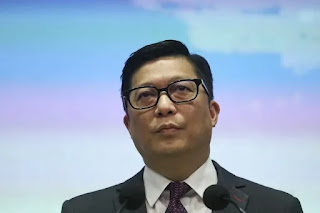 |
| Kim Thuy's novel Ru was adapted for the screen in 2023 |
As part of the Vancouver Writers Fest, this evening had the chance to see Kim Thuy again -- in person and on the big screen! In 2009, her book Ru was published, described as a novel about her impressions of her family fleeing Vietnam as refugees and then making it to Quebec, Canada.
She explained after the film screening of Ru that she wrote about her own memories and did not consult her parents about what happened -- it was how she remembered it.
Ru became a bestseller, originally in French and then translated into English which got even more people reading the novel.
 |
| Thuy was 10 years old when she came to Canada |
Before Thuy became a writer she was a restaurateur and one of her regular customers was a man she thought had no friends, and read books, but in fact he was reading scripts. He helped her get her story published and then he bought the rights to turn the book into a film.
The film opens showing 10-year-old Thuy, her first name Tinh, in a wealthy home in Saigon, with her grandmother, parents, two younger brothers and an uncle. Her father was a deputy minister in the government. But Communist soldiers charge into the house, ransacking it, and the family has to leave.
They flee onto a ship, then a small boat and make it to a refugee camp (in Malaysia, but it's not explained in the film), and from there the family is chosen by the Canadian government to go to Quebec because Thuy's parents can speak French fluently.
But when they arrive, it's in the depths of winter and they've never seen snow before. Thuy later said when they arrived she was overwhelmed by the snow, but also they were very unhealthy, having lived in a refugee camp for months, sleeping next to the open latrines so they had a lot of infections, lice in their hair, diarrhea.
However, the small town they went to welcomed them with open arms, giving them a reception and paired up families with a sponsor family who helped them get set up rent-free for the first three months, helped them with furniture and integrating into Canadian life.
 |
| The family landed in Quebec in 1979 |
And this, Thuy says, is what makes her so grateful for this sponsor family and everyone, including her first teacher in Quebec, to help her to learn how to be Canadian.
Her parents had a rough time starting over, as her dad began working as a food delivery person for a Chinese restaurant, her mother a seamstress in a clothing factory.
In one poignant scene, an elderly Vietnamese man who shovels snow tells Tinh that he used to be a judge and nearly had his brains blown out. But when the soldier ran out of bullets, the former judge looked up at the sky and for him it was his ticket to freedom. Which is why he kept asking her about the colour of the sky.
When the filming began, it was all shot in Montreal and they could not go to Vietnam nor Thailand because of Covid-19. Thuy was named associate producer in the film, but she says she was only given this role so that she could be on set because of pandemic restrictions.
Thuy recalls when she stepped onto the set of the home, she began crying because it brought her back to when she was 10 years old, and made us the audience realise that she still hadn't fully processed her trauma. She said the most emotional scene for her was the car driving along a stretch of road in the snow, which to Thuy says demonstrates how far her family had come, and she found it unbelievable that they had come from Vietnam and were now in Canada.
 |
| Thuy (right) is grateful about being in Canada |
She also says it was at the age of 50 that she first expressed anger, being in touch with emotions she had repressed for decades because her family had to live with Communist soldiers in the house, so they didn't dare say anything that would incriminate themselves; she was forced at school to denounce her parents and grandparents for playing music, or reading books and such. So it was best to keep quiet about everything.
These days she's very open, emotional, lively and grateful for everything that has happened to her in her life. At the end of the family the post script says her parents retired, and her brothers became an actuary (for Sun Life) and a dentist.
Someone asked what Ru means, and she said in French it's a small stream at the top of a mountain, which eventually becomes a river, while in Vietnamese it means a lullaby, lulling a child to sleep. So to her both words were beautiful images she wanted to convey.
Ru
Directed by Charles-Olivier Michaud
116 minutes
Based on Ru by Kim Thuy


















































